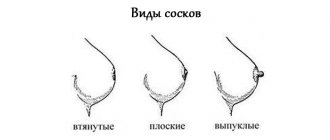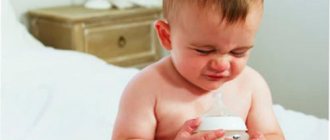- Why is a cold dangerous?
- Taking medications
- Should I stop feeding?
- The importance of breastfeeding
- Passive immunity of an infant
- Properties of breast milk
Why are colds dangerous while breastfeeding?
Pregnancy, childbirth and recovery after childbirth, as well as lack of sleep, worries and caring for an infant - this is a test for the body of a young mother - the body's defenses are reduced during this period. Against this background, any disease can be more severe. The main danger is complications arising from the addition of bacterial flora. A viral disease can be complicated by bronchitis, damage to the ENT organs, and pneumonia. Sinusitis, tonsillitis, and otitis are treated with antibiotics, which is extremely undesirable during lactation. A cold can also trigger an exacerbation of chronic diseases. If the infection is not stopped at the very beginning, the disease may drag on and a longer period of treatment will be required. Due to this, treatment takes longer, thereby exposing the mother’s body to unnecessary stress, which can have a negative impact on the child. The arsenal of remedies usually used to treat colds is significantly narrowed during breastfeeding. Thus, folk remedies: honey, citrus fruits, red berries are usually not recommended during lactation, as they can cause allergies in the baby. The inclusion of the drug VIFERON rectal suppositories in the treatment regimen reduces the risk of complications and shortens the period of manifestation of symptoms of the disease. This drug is approved during lactation.
If mom is sick: can I breastfeed?
What diseases make breastfeeding impossible?
If a nursing woman becomes ill, doctors may recommend that she stop breastfeeding. Depending on the type and severity of the disease, refusal may be:
- temporary or permanent;
- complete (when it is forbidden to use even expressed milk to feed the baby);
- partial (when it is allowed to use expressed milk without restrictions, but you cannot put the baby to the breast).
An absolute ban on breastfeeding (no matter whether the baby receives it directly from the breast or expressed) is the most categorical recommendation. In pediatric practice, such situations arise relatively rarely. These include, for example, HIV infection or an open form of tuberculosis in the mother. In the case of tuberculosis, a sick woman is a source of infection for others and should be treated in a specialized hospital. In first place in terms of the risk of infection is, of course, her child.
Not only these diseases themselves are incompatible with breastfeeding, but also the drugs used to treat them, which can have a negative effect on the baby’s body.
Temporary refusal of breastfeeding during illness
Temporary cessation of breastfeeding may be recommended when the feeding process is difficult for the mother due to her poor health. The reasons can be very different:
- increased blood pressure;
- pain of various localizations;
- heart diseases;
- previous surgery, etc.
In such a situation, a woman may need medications that are not compatible with breastfeeding. At the same time, the mammary glands still need to be emptied by pumping, otherwise there is a risk of a new problem for the nursing mother - milk stagnation.
You can express by hand or using a breast pump. In both cases, a woman’s poor health may require help from medical personnel. Expression should be carried out according to the baby’s feeding schedule - at least every three hours. At night it is also necessary.
Doctors may advise temporarily feeding the baby with expressed milk if the mother has pathological rashes on the mammary glands: for example, herpetic (blisters filled with clear liquid) or pustular (blisters filled with pus). This recommendation applies to cases where the area of the nipple and areola is not affected.
It should be taken into account that more extensive rashes make it difficult to express and collect uninfected milk, and also require serious treatment for the mother, in which medications can get to the baby along with the milk, and this is undesirable for the baby.
Of course, different situations require an individual (taking into account the severity of the disease and treatment) approach to the problem.
For what diseases is breastfeeding allowed?
It must be borne in mind that breastfeeding or feeding a baby with expressed breast milk is possible with most common, mild infections in women.
Thus, acute respiratory infections (ARI) and cytomegalovirus infection are not grounds for transferring a child to artificial nutrition.
In case of acute respiratory infections, in order not to infect the baby, a woman should wear a disposable mask during feeding, which can be bought at a pharmacy (a new mask is used for the next feeding!).
You can also continue breastfeeding if you have a urinary tract infection, toxoplasmosis, or postpartum endometritis (inflammation of the lining of the uterus). However, in these cases, undesirable medications taken by the mother may enter the baby’s body with milk. Then a temporary cessation of breastfeeding is recommended primarily not because of the disease itself, but to eliminate the consequences of aggressive therapy for the child’s health. If such a threat exists, doctors try to prescribe medications to the nursing woman that will not harm the baby. But in some cases this is not possible.
You can breastfeed a child with hepatitis A and B, but in the case of the latter, the baby needs to be vaccinated against hepatitis B immediately after birth (it is performed on the first day of life, then at 1, 2 and 12 months). Hepatitis C is also not an absolute contraindication to breastfeeding.
Chicken pox (chickenpox) in a mother requires an individual approach in deciding whether to breastfeed the child. The most dangerous situation is when a woman develops characteristic rashes a few days before giving birth or in the first days after giving birth. At the same time, the mother cannot transfer the required amount of protective proteins-antibodies to her baby, since they have not yet had time to be developed. If the child is correctly prescribed preventive treatment (specific immunoglobulin against chickenpox), then breastfeeding can be allowed.
The presence of staphylococcus in breast milk is not a contraindication to breastfeeding. This microorganism normally lives on the skin and can be transferred into milk from the skin of the mammary glands or from the mother’s hands when expressing milk. Its moderate amount in milk should not be regarded as a sign of breast inflammation, especially if there are no symptoms of mastitis (pain and redness of the breast, fever, etc.). Prescribing a breast milk test for staphylococcus without an obvious reason is unreasonable.
Breastfeeding during mastitis is possible and in most cases even indicated, since it improves drainage of the affected mammary gland, thanks to the sucking process, and does not harm the baby. This primarily concerns uninfected (catarrhal) mastitis. In the case of purulent mastitis or the occurrence of abscesses (ulcers) in the mammary gland, the decision is made by the surgeon. Sometimes it is necessary to temporarily transfer the child to adapted milk formulas.
In this case, the breast must be expressed, and a breast pump in this case is more preferable due to the gentle pressure on the areola.
The admissibility of feeding a baby with expressed milk when the mother has mastitis depends on several factors:
- the extent of damage to the mammary gland;
- quality of milk (first of all, the presence of pus in it);
- the nature (aggressiveness) of mastitis treatment (that is, the compatibility of prescribed medications with breastfeeding).
In most cases, the baby is temporarily transferred to infant formula; expressed mother's milk is not used to feed him, primarily due to the use of drugs for the treatment of mastitis, which can harm the baby if it gets into his body with milk.
After treatment is completed, the woman resumes breastfeeding. Exactly when this happens depends on the rate at which the drugs are eliminated from the body. The doctor's recommendations in this regard are based on the information specified in the annotation for the drug. On average, 1–2 days after stopping medication, milk is considered safe for the child.
Breastfeeding and mother's treatment
There are three groups of drugs:
- strictly contraindicated during breastfeeding;
- incompatible with breastfeeding;
- compatible with it.
Special tables have been developed that can be used to judge how intense the transition of a particular drug from the mother’s blood into breast milk, and from it into the baby’s body.
Obviously, the most optimal medicine for the mother is one that is not excreted in milk. For example, in the case of the well-known aspirin (acetylsalicylic acid), the situation does not look so harmless: 60–100% of this drug passes through breast milk to the baby.
It is also necessary to take into account that even with a minimal probability of penetration of the drug into milk, the negative effect of the drug can be very serious. For example, many antibiotics are released into milk to a limited extent, but cause significant undesirable consequences for the child. First of all, this is dysbiosis - a violation of the intestinal microflora.
It should be noted that not all medications have data on their compatibility with breastfeeding. If there is no clarifying information for any particular drug, then in the annotation for such a drug you can most often read the phrase “not recommended during lactation.”
As a rule, in such situations, the decision is made by the nursing mother and the pediatrician observing the child. If the benefits of breastfeeding outweigh the potential (but unproven) harm from the possible ingestion of the drug into the baby’s body, a choice is made in favor of continuing breastfeeding. Of course, such cases require careful monitoring of the baby’s health by doctors.
How to replace breast milk?
What to do if doctors still forbid a sick mother to breastfeed?
The choice is alternative nutrition. Currently, a large assortment of adapted milk formulas for both full-term and premature babies is on sale. Your pediatrician will help you choose the most suitable option for your baby.
When choosing an alternative to breastfeeding, it is important to know whether transferring the baby to artificial nutrition will be temporary or the baby, unfortunately, will no longer be able to return to breast milk. The second option is typical for a serious pathology in the mother that requires long-term treatment (for example, HIV infection, tuberculosis or cancer).
If artificial feeding is a temporary phenomenon, then the woman should definitely maintain lactation by frequent pumping according to the baby’s feeding regimen - that is, at least 8-12 times a day. For children in the first months of life – once every 2.5–3 hours. Expressed milk is not offered to the baby and is not stored.
The pediatrician allows the mother to give expressed milk to the baby only in situations where feeding directly from the breast is dangerous, but the milk itself does not pose any threat to the baby. For example, if a woman has herpetic rashes on the mammary glands or severe cough and runny nose.
Cold medicines while breastfeeding
During breastfeeding, the vast majority of medications are either not recommended or are used only if the expected benefit to the mother outweighs the potential risk to the baby. For colds, experts advise using local forms of medicines: ointments, gels, softening lozenges, rinsing and irrigating the nose and throat with antiseptic solutions, inhalations. Symptomatic treatment of ARVI allows relief of fever at temperatures above 38°C with the help of antipyretic drugs based on paracetamol. Antiviral drugs that have a direct effect on the cause of the disease - viruses, are also prescribed with caution to nursing women, however, among them there are those that are acceptable during lactation, for example VIFERON - a broad-spectrum antiviral agent that has a gentle effect on the body. It is advisable to begin antiviral treatment as quickly as possible, in the first two days from the onset of symptoms, while the virus is still in the initial stage of reproduction. The inclusion of the drug VIFERON Rectal Suppositories in the complex therapy of acute respiratory infections of both viral and viral-bacterial etiology contributes to:
- relief of symptoms of ARI and influenza by the end of the third day
- reduction in the development of bacterial complications from the upper respiratory tract by 16.7%
- milder clinical course of the diseaseii.
Interferon, the active ingredient of the drug VIFERON, is included in the Rosminzdrav standard for the provision of medical care in the treatment of ARVI and influenzaiii
To prevent infection on the street and in public places, you can use the form of the drug VIFERON Gel, but it is worth remembering that during lactation it is applied only to the nasal passages, avoiding use on the nipples and areolas.
Nasal drops approved for breastfeeding
It is important to carefully consider the choice of nasal drops when breastfeeding. Many medications cannot be taken while breastfeeding; there is a risk of the baby developing an allergic reaction to the treatment of the mother’s cold or undesirable effects from the treatment.
Before starting treatment, you should definitely consult with your doctor; he will be able to select safe drops for treatment during breastfeeding.
In modern pharmaceuticals there are more than 10 different drops for the treatment of a runny nose, but only a few of them are allowed to be used during breastfeeding. Cold drops used to treat rhinitis are divided into several types:
- drops based on sea water,
- vasoconstrictors (adrenergic agonists),
- antiallergic drops,
- antiseptic and antibacterial agents,
- homeopathic drops.
Nasal drops based on sea water
Salt preparations are considered the safest for treating a runny nose. Their safety lies in simple, but at the same time, very effective components, sea water purified from impurities, which contains useful minerals and trace elements. They are effective in the treatment of rhinitis of almost any nature, including allergic and infectious rhinitis. Sea water relieves swelling in the nose, has an anti-inflammatory, wound-healing and antiseptic effect. Some of the most famous products based on sea water include:
| Drugs | Photo | Price |
| Dolphin | From 290 rub. | |
| Aquamaris | From 170 rub. | |
| No-Sol | Check | |
| Aqualor | From 360 rub. | |
| Morenasal | From 265 rub. | |
| Physiometer | From 424 rub. |
Vasoconstrictor drops
This group of drugs quickly relieves swelling of the nasal mucosa and restores normal airway patency. Drops should be taken with caution, as they can have a systemic effect on the body of the mother and baby. Manifestations of the systemic effect of the drug will be cardiac dysfunction, nausea, and dizziness.
When prescribing these medications, it is recommended to start with small doses, and if there are no side effects, use the prescribed amount of the drug. To prevent unwanted effects, you should give preference to drops that have a minimum of side effects.
The following medications can be recommended for nursing mothers:
| A drug | Photo | Price |
| Otrivin | From 180 rub. | |
| Nazivin | From 180 rub. | |
| Rhinorus | From 77 rub. | |
| Knoxprey | From 110 rub. | |
| Rhinonorm | From 73 rub. | |
| Nazol-Baby | Check | |
| Indanazoline | Check |
Do not forget that drugs in this group can be addictive. Nursing mothers can take them no more than 3 times a day and no more than 3-5 days in a row. If vasoconstrictor drops are used irrationally, complications may occur in the form of degenerative changes in the nasal mucosa and drug-induced rhinitis.
Antiallergic drugs
Nasal antihistamines relieve an attack of allergic rhinitis by blocking the release of inflammatory mediators from mast cells that induce upper airway obstruction. When breastfeeding, it is recommended to use the following drops:
- "Renitek"
- "Sanorin-Analergin"
- "Antazoline-Naphazoline"
- "Nazaval."
| Drugs | Photo | Price |
| Sanorin-Analergin | From 79 rub. | |
| Nazaval | From 405 rub. | |
| Renitek | from 87 rub. | |
| Naphazoline | specify |
A special feature of the drug “Nazaval” is that it forms a film on the surface of the mucous membrane that protects against the penetration of allergens. It can be used for seasonal allergies during breastfeeding.
- Services and prices
Antiseptic and antibacterial drops
One of the complications of ARVI can be bacterial rhinitis. The reason is irrational treatment of viral infection. Signs of bacterial rhinitis include:
- yellow-green viscous nasal discharge,
- swelling of the nasopharynx,
- temperature increase,
- muscle pain.
If pathogenic microflora is not killed in a timely manner, sinusitis, sphenoiditis, and bacterial nasopharyngitis may develop. Among the antibacterial and antiseptic agents, nursing mothers can use the following drugs:
| Drugs | Photo | Price |
| Bioparox | Check | |
| Miramistin | From 240 rub. | |
| Polydexa | From 280 rub. | |
| Octenisept | From 508 rub. |
The course of therapy with antibacterial drops is at least 7 days. Premature refusal of their use will entail the development of a resistant strain of microorganisms to the active substance.
During treatment with antibiotics, you should stop breastfeeding due to the risk of developing dysbacteriosis. Continue to express and pour out the milk, and transfer the baby to formula feeding during this period. The choice of formula must be discussed with your local pediatrician.
Homeopathic drops
Recently, the media have often stated the exceptional effectiveness of homeopathic medicines, including in the treatment of the common cold. The amount of active substance in these drops is so small that it has virtually no effect on the body. They can be used during pregnancy, breastfeeding and in combination with other drugs. Homeopathic medicines that are used for a runny nose include:
| Drugs | Photo | Price |
| Delufen | Check | |
| Edas-131 | From 150 rub. | |
| Euphorbium Compositum | From 470 rub. | |
| Rinildix | Check |
Should I stop feeding if I have a cold?
If you have a fever, aches, coughs, pain or sore throat, or other symptoms of a cold, you should call a doctor at home, who will help you choose drug therapy that is compatible with breastfeeding in order to maintain lactation and not harm the baby. Following your doctor's recommendations will help you overcome the difficult period faster, minimize the risk of complications and continue breastfeeding. Moreover, the list of diseases and conditions for which it is recommended to stop breastfeeding is very limited. In Russia, breastfeeding is contraindicated for women infected with HIV and those with acute mental disorders. Postpartum depression of mild and moderate severity is not such; on the contrary, close contact with the child provokes the production of hormones of calm and happiness. The list includes especially dangerous infections, open form of tuberculosis, as well as carriage of rare viruses. There is a possibility that breastfeeding will be contraindicated for you if there is significant blood loss during childbirth and the postpartum period, as well as with decompensated chronic diseases of the heart, lungs, kidneys, liver, and the serious condition of the woman due to infectious diseases is taken into account. Diseases of a nursing mother such as rubella, chickenpox (herpetic infection), measles, mumps (infectious parotitis), herpes simplex, acute intestinal and respiratory viral infections, if they occur without severe intoxication, like colds, are not a contraindication to breastfeeding subject to general hygiene rules. In any case, if there is a suspicion of any infection, you will need to consult a specialist who will help assess the risks for the nursing mother and advise what to do: continue feeding or not. Mothers suffering from alcohol and drug addiction should not breastfeed. Tobacco smoke, nicotine and tar also negatively affect the child’s body and lactation, so it is important for women who smoke during lactation to stop smoking. Nicotine and its metabolites are excreted in breast milk throughout the dayiv.
How to properly treat a runny nose?
Having found out that a runny nose is not a separate disease, but serves as one of the signs of acute respiratory infections, it is natural to assume that its treatment is carried out comprehensively. Let's consider the main components of therapy:
- Bed rest. Aimed at easing the course of the disease and shortening its duration. It is necessary to maintain it for 2-3 days to prevent the disease from worsening.
- Drink plenty of fluids. Increase the amount of liquid consumed: tea, compote, still water. Drinks will help remove toxins formed during the active activity of viruses and improve the general condition of a nursing mother.
- Humid and fresh air. When staying indoors for a long time, try to maintain normal humidity and regularly ventilate the rooms. The humidity level cannot be lowered below 60%, otherwise the nasal mucous membranes will experience discomfort from drying out, and the mucus will become more difficult to separate, interfering with the functioning of the immune defense. For the heating season, use a household humidifier.
- Maintain the air temperature in the house around +22 degrees.
- Decreased body temperature. A cold during lactation often causes a rise in temperature (we recommend reading: a cold in a nursing mother: how and what to treat?). There is no need to rush to take antipyretics if the thermometer shows less than 38.5. It is irrational to knock down a slight increase, since this is an indicator of your body’s fight against infection. The immune system produces antibodies that kill viruses. Temperatures above 38.5 degrees will be relieved by paracetamol or ibuprofen. Both drugs have an analgesic effect, relieve headaches and colds. In addition, ibuprofen also has an anti-inflammatory effect.
READ ALSO: what to do if a nursing mother has a temperature of 38 degrees: Komarovsky’s advice Once you have an acute respiratory infection, you should not stop breastfeeding your baby. The antibodies produced by your body are transferred to the baby through mother's milk, strengthening his immunity. A rising temperature is also not a reason to wean your baby off the breast. It is better, on the contrary, to give it to your baby more often, this way you will help yourself maintain normal lactation and will not leave your child hungry.
During treatment, it is better to maintain bed rest and be actively treated with approved medications.
The importance of breastfeeding
Rapid growth and development in infancy, the formation and formation of all organs and systems, building and improving their functions require a full supply of basic nutrients and nutrients. The nutrition of a child in the first year of life determines the state of his health not only during this period of time, but throughout his entire life. Evolutionarily, a balance has developed between the mother’s body’s ability to satisfy the child’s nutritional needs and the baby’s body’s ability to absorb the necessary nutrients as completely as possible. Breast milk not only helps the baby develop important life cycles, such as sleep and wakefulness, but also resists a number of diseases. The role of breast milk in the prevention of acute and chronic infections in children has been confirmed. Breastfeeding is associated with a decrease in the incidence of otitis media, gastrointestinal and respiratory tract infections.
Passive immunity of an infant
By the time of birth, the baby’s immune system, which performs a protective function, remains insufficiently mature and cannot fully protect the body from infections. Passive immunity, obtained from the mother through breast milk, allows you to compensate for the lack of the child’s own immunity. It is provided by a number of components, primarily immunoglobulins, which perform the functions of antibodies. Breast milk contains antibodies against all those bacteria and viruses that the mother comes into contact with. Because mother and baby are particularly close and share the same environment, these factors give breast milk the ability to protect the baby from precisely those microorganisms to which it is most vulnerable.
Danger of a cold
Influenza viruses travel quietly through the air from infected people to healthy people. It is not necessary to sneeze or cough; germs come out of the respiratory tract with air during normal conversation. The infection from the mother reaches the mucous membranes of the child's respiratory tract. If the mother is sick, there is no need to stop breastfeeding, since the antibodies produced by her immune system in response to infection enter the breast milk and protect the baby from infection.
If you do not attach much importance to a cold and do not treat it on time, you may encounter serious complications. It must be remembered that treatment of colds during breastfeeding cannot be done independently, since the vast majority of drugs that are familiar to us and used constantly are not suitable.











